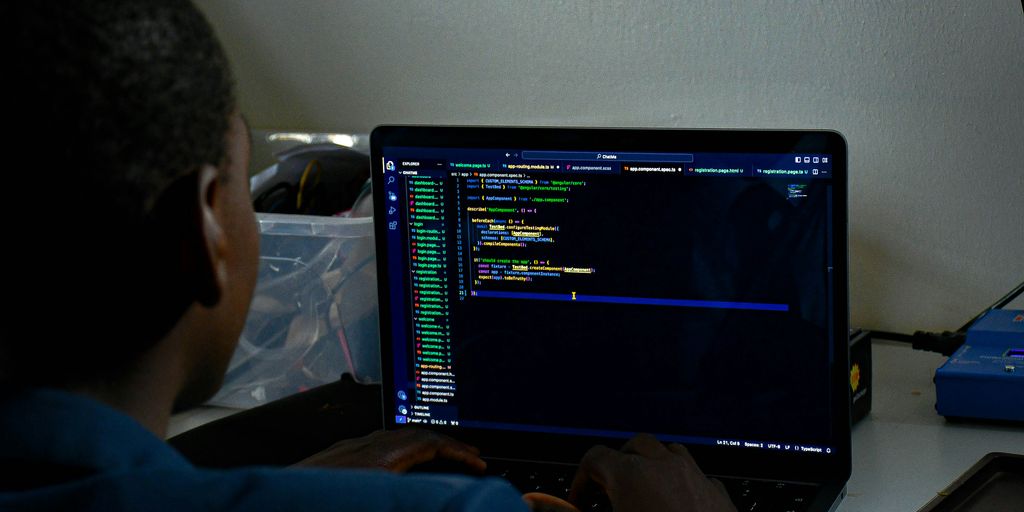So, you’re looking to get ahead in IT, huh? The tech world changes fast, and staying current means picking up new skills. That’s where the Google IT Automation with Python Professional Certificate comes in. It’s not just another online course; it’s a way to really get good at automating stuff, which is super important these days. This program helps you learn Python and other tools to make your IT work smoother and faster. Pretty cool, right?
Key Takeaways
- The Google IT Automation with Python Professional Certificate helps IT folks learn to code and automate tasks.
- This program teaches Python, which is a big deal for automating IT operations.
- You’ll learn how to work with operating systems and use version control tools like Git.
- The certificate covers how to troubleshoot problems and manage system setups.
- Getting this certificate can open doors to better jobs and higher pay in IT.
The Evolving Landscape of IT Automation

IT used to be one thing, and development was another. You had your IT people setting up networks and keeping the servers running, and then you had developers writing code. But things changed, especially with the rise of cloud computing and DevOps. Now, IT folks need to know how to code and automate stuff. It’s just how it is. The Google IT Automation with Python Professional Certificate is all about this shift. It’s for people who want to move from regular IT support to the world of IT automation. It teaches you Python and tools like Git, so you can actually automate things.
Bridging the Gap Between IT and Development
The lines between IT and development are blurring. It’s not enough to just know how to set up a server; you need to know how to write code to manage it, too. This certificate helps bridge that gap by teaching IT professionals the programming skills they need to automate tasks and work more closely with developers. Think of it as leveling up your IT game. You can even contribute to open-source DevOps tools after you learn the basics.
The Imperative of Automation in Modern IT
Automation isn’t just a nice-to-have anymore; it’s a must-have. Companies need to automate to stay competitive and efficient. That means automating everything from deploying applications to managing servers. If you don’t automate, you’re going to fall behind. Python’s dominance in the world of automation is not accidental. It is used in nearly every major industry, from finance to healthcare, but particularly excels in IT environments due to its simplicity and extensive standard libraries. IT professionals can use Python to automate system tasks such as file handling and log parsing.
The Role of the Google IT Automation with Python Professional Certificate
This certificate is designed to give you the skills you need to succeed in this new landscape. It teaches you Python, Git, and other tools that are essential for IT automation. But it’s not just about learning the tools; it’s about learning how to use them to solve real-world problems. You’ll learn how to automate tasks, manage servers, and deploy applications. It’s about giving you the skills to transform systems through scripting and make a real impact. You’ll also learn strategies to continue building their GitHub portfolio.
A Strategic Initiative from Google
Google’s entry into IT education with this certificate is pretty interesting. It’s not just another course; it feels like a real attempt to get more people into tech, especially those who might not have had the chance otherwise. They’re using their resources to make tech education more accessible, which is a cool move.
Democratizing Tech Education Globally
Google’s not just aiming at one specific group; they’re trying to reach people all over the world. It’s like they’re saying, "Hey, if you’ve got the drive, we’ll give you the tools." This is especially important because tech skills are becoming more and more important, and not everyone has equal access to training. Google’s initiative helps level the playing field.
Python as a Core Automation Language
Choosing Python as the main language was a smart move. It’s relatively easy to learn, and it’s super powerful for automation. Plus, there’s a huge community of Python developers out there, so learners have tons of resources to tap into. It’s not just about learning a language; it’s about learning a skill that’s actually useful in the real world. The course really emphasizes Python fluency.
Progressive Skill Building Across Six Courses
The way the certificate is structured, with six courses that build on each other, makes a lot of sense. It’s not like they’re throwing you into the deep end right away. You start with the basics and gradually work your way up to more complex topics. This approach helps people actually learn and retain the information, instead of just getting overwhelmed. It’s a well-thought-out curriculum that sets learners up for success. It’s a great way to learn IT automation.
Core Curriculum: Building Foundational Skills
This part of the Google IT Automation with Python Professional Certificate is all about getting your hands dirty with the basics. It’s where you’ll build the bedrock for everything else you learn. Think of it as your IT automation boot camp. You’ll start with the very basics of Python and work your way up to using it to manage operating systems and track changes to your code.
Mastering Python Fundamentals
Okay, so you’re diving into Python. What does that even mean? Well, this section covers the core stuff: variables, data types, loops, functions – the whole shebang. It’s not just about learning the syntax; it’s about understanding how to think like a programmer. You’ll learn how to break down problems and translate them into code. It’s like learning a new language, but instead of talking to people, you’re talking to computers. You’ll gain skills in computer programming and development environments.
Interacting with Operating Systems Using Python
Now, this is where things get interesting. You’re not just writing code in a vacuum; you’re using Python to control your computer. This section teaches you how to use Python to interact with the operating system – things like creating files, managing processes, and automating tasks. Imagine being able to write a script that automatically cleans up your downloads folder or restarts a service when it crashes. That’s the kind of power you’ll unlock here. You’ll learn about problem management and debugging.
Version Control with Git and GitHub
So, you’re writing code, making changes, and things are getting messy. That’s where Git and GitHub come in. Git is a version control system that lets you track changes to your code, and GitHub is a platform for hosting Git repositories. Think of it as a time machine for your code. You can go back to previous versions, see who made what changes, and collaborate with others without stepping on each other’s toes. It’s a must-have skill for any developer or IT professional. You’ll also learn about algorithms and data structures.
Culminating the Learning Journey
The final part of the Google IT Automation with Python certificate gets you ready for the real world of IT. It focuses on the important, but often overlooked, areas of fixing problems, managing setups, and putting together complete automated solutions.
Troubleshooting and Debugging Techniques
Let’s face it, stuff breaks. Scripts fail, servers won’t start, and data gets messed up. Being able to find and fix these issues is super important. It might even be more important than writing perfect code in the first place. This part of the certificate teaches you how to systematically find and fix problems. You’ll learn how to read error messages, use debugging tools, and come up with solutions under pressure. It’s about more than just fixing code; it’s about keeping systems running smoothly. You’ll gain skills in:
- Analyzing log files to identify root causes.
- Using debuggers to step through code and inspect variables.
- Implementing error handling to prevent future issues.
Configuration Management and Cloud Integration
Once you can write scripts, you need to manage them. Configuration management is all about keeping your systems consistent and up-to-date. This section shows you how to use tools like Ansible or Puppet to automate the setup and management of servers. Plus, you’ll learn how to integrate your automation with cloud platforms like Google Cloud or AWS. This means you can automatically create, configure, and manage resources in the cloud. This is a big deal because it lets you scale your infrastructure without a ton of manual work. You’ll explore:
- Using configuration management tools to automate server setup.
- Integrating with cloud platforms for scalable infrastructure.
- Managing configurations as code for version control and reproducibility.
Automating Real-World Tasks with Python
This is where it all comes together. You’ll use everything you’ve learned to automate real-world IT tasks. Think about things like creating user accounts, managing network devices, or deploying applications. You’ll work on projects that simulate real-world scenarios, so you get hands-on experience with the challenges and rewards of automation. The professional certificate program offers hands-on projects, culminating in a capstone project, to develop practical technical skills. It’s not just about writing code; it’s about solving problems and making IT more efficient. You’ll learn how to:
- Automate common IT tasks to reduce manual effort.
- Develop scripts to manage network devices and user accounts.
- Deploy applications automatically using Python and cloud services.
Career Trajectories and Earning Potential
High Demand for Python Fluency in IT Roles
Let’s be real, the job market is tough, but some skills are like gold. Python is definitely one of them, especially in IT. Companies are screaming for people who can automate stuff, and Python is the go-to language for that. It’s not just about knowing the syntax; it’s about understanding how to use it to make things easier. Think about it: less manual work, fewer errors, and faster processes. That’s what businesses want, and that’s why Python fluency is a major plus on any IT resume.
Elevating Salaries with Automation Expertise
Okay, let’s talk money. Knowing Python for IT automation isn’t just a cool skill; it’s a way to boost your paycheck. Companies are willing to pay more for people who can save them time and money through automation. It’s simple economics. The more you can automate, the more valuable you are. Think about scripting repetitive tasks, managing configurations, or even setting up cloud infrastructure. These are all skills that translate directly into higher earning potential. It’s not just a raise; it’s a whole new level of income.
Transforming Systems Through Scripting
It’s not just about getting a job or making more money; it’s about changing how things are done. With Python, you can literally transform IT systems. Imagine taking a clunky, manual process and turning it into a smooth, automated workflow with a few lines of code. That’s the power of scripting. You’re not just fixing problems; you’re building solutions. You’re making things more efficient, more reliable, and ultimately, more valuable to the business. It’s about being a problem-solver and a creator, all in one. This is where the real satisfaction comes from.
Beyond the Certificate: Continuing Your Automation Journey
Okay, so you’ve got the Google IT Automation with Python Professional Certificate. Congrats! But honestly, that’s just the beginning. Think of it as your launchpad, not the final destination. The world of automation is HUGE, and there’s always something new to learn. The certificate gives you a solid base, but continuous learning is key to staying relevant.
Advanced Python Applications
Don’t stop at the basics. Dive deeper into Python. I’m talking about stuff like asyncio for handling multiple tasks at once, working with APIs to connect different services, and managing databases to store and retrieve information. These are the things that separate a good Python scripter from someone who can really build powerful automation tools. For example, you could learn how to use secure code training software to improve your code quality.
Cloud-Native Scripting and Infrastructure as Code
The cloud is where it’s at these days, so you need to get comfortable scripting in that environment. That means learning tools like Terraform and Ansible for managing infrastructure as code. And if you’re working with Google Cloud, get familiar with the Google Cloud SDK. This lets you automate tasks like creating virtual machines, configuring networks, and deploying applications. It’s all about making your infrastructure programmable and repeatable.
Implementing CI/CD Automation Pipelines
CI/CD (Continuous Integration/Continuous Deployment) is how modern software gets built and released. It’s all about automating the process of building, testing, and deploying code changes. Learn how to use tools like Jenkins or GitHub Actions to create these pipelines. This will let you automate everything from running unit tests to deploying code to production. It’s a game-changer for speed and reliability. You can even contribute to open-source DevOps tools to gain more experience.
Conclusion
So, what’s the big takeaway here? The Google IT Automation with Python certificate is a pretty big deal. It’s not just another online course; it’s a way to really change your career path. Over six courses, you learn a lot, from basic Python stuff to how to handle big IT problems. You start out just learning how to type "Hello, world!" and end up being able to automate things, fix issues, and keep IT systems running smoothly. This program isn’t about becoming a software developer, not really. It’s about becoming a better IT person, someone who can make things easier, cut down on mistakes, and bring some order to the usual IT chaos. It’s a solid step forward for anyone looking to get ahead in tech.
Frequently Asked Questions
Who is this Google IT Automation with Python certificate for?
This certificate is great for anyone who wants to get into IT, especially if you’re new to the field or want to switch careers. It also helps current IT folks learn new skills to make their jobs easier and more efficient.
Do I need to know how to code before I start this program?
You don’t need to be a coding expert to start. The program begins with the basics of Python, so it’s good for beginners. As you go along, you’ll learn more advanced stuff.
What kind of things will I be able to do after finishing this certificate?
The program teaches you how to use Python to automate common IT tasks, like managing computers, organizing files, and fixing problems. It helps you work smarter, not harder.
Will this certificate help me get a better job or earn more money?
Yes, many jobs in IT today need people who can automate tasks. This certificate can help you get roles like IT support specialist, systems administrator, or even junior DevOps engineer, which often pay more.
How is the course taught, and how long does it take to finish?
The program is usually offered online through platforms like Coursera. You can learn at your own speed, which means you can fit it around your schedule.
Why did Google create this specific certificate?
Google created this certificate to help more people get important tech skills. They saw that businesses need people who can automate IT tasks, and Python is a powerful tool for that.














